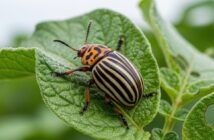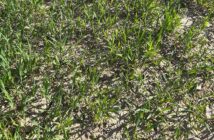Growers and agronomists have been urged to send brown rust samples into the UK cereal pathogen virulence survey (UKCPVS) to help investigate a suspected virulence change in its population.
Speaking at the recent Association of Independent Crop Consultants (AICC) summer technical conference, AICC president and NIAB northern regional agronomist Patrick Stephenson said the disease is an Achilles heel of many popular UK wheat varieties. It is now being found on variety Theodore – a hard group 4 wheat with a resistance score of 8 – in untreated trials indicating a potential shift in the UK population.
Compounding matters is a warming climate, which is encouraging geographical spread and Mr Stephenson said high levels of late season brown rust are being found much further north following a hot June: “Only 13 samples have been received so far and UKCPVS need more. Please, if you find brown rust, send in a sample so we can get a better handle on what’s going on. There is certainly something happening out there.”
While UKCPVS pathologists need disease samples from varieties with high resistance ratings, samples from susceptible varieties are also important, as they offer insight into population diversity.

Andrew Blazey
AICC Chairman and Prime Agriculture agronomist Andrew Blazey, who advises in the east of England, called for AICC members and wider industry to engage with pathogen, weed, and pest monitoring initiatives such as UKCPVS.
Providing samples for researchers investigating how diseases behave on cereal varieties, the herbicide resistance status of grassweeds, or insecticide resistance status of key pests like cereal aphids, are critical, he stressed: “It doesn’t take much time to take a sample post it. The results ensure advisers and growers have the most up to date information on managing some of these challenges in UK crops.”
When taking brown rust, yellow rust or mildew samples in the field, growers and agronomists should take infected leaves and wrap them in tissue paper, before placing in an envelope and sending to FREEPOST UKCPVS with a completed sample form.




